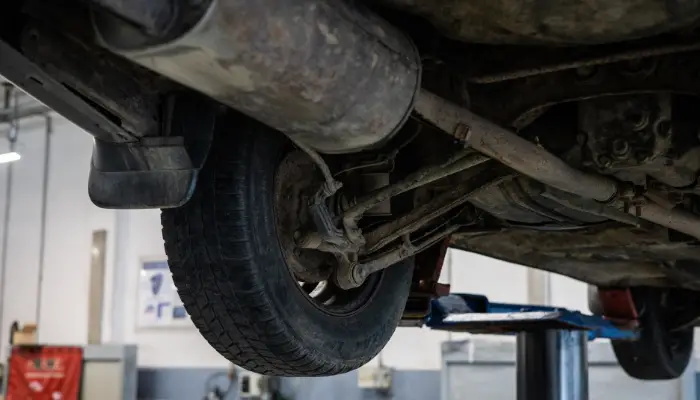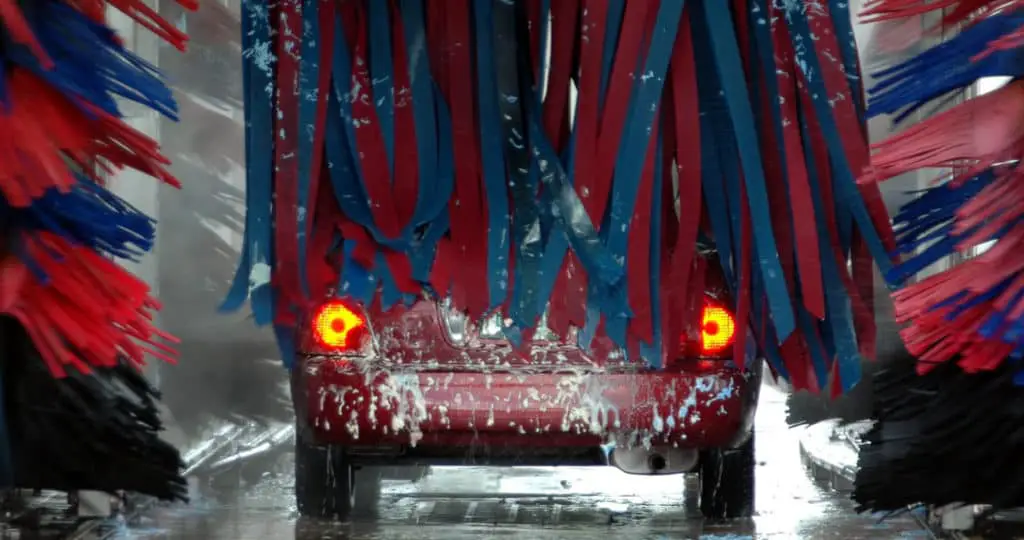- How to Clean Car Carpets Quickly (Without An Extractor) - July 10, 2024
- Can You Touch Up Clear Coat On A Car? Yes and No (Here’s Why) - November 25, 2023
- How To Wax A Car By Hand (For Beginners) - November 14, 2023
Last Updated on January 21, 2025 by Nate Schnell
For drivers in regions exposed to road salt, preventing rust on your car’s undercarriage is a constant battle. While southerners may not face this challenge as often, rust can affect vehicles anywhere, particularly on the exhaust system. This guide will show you how to remove rust from your car’s exhaust system, prevent further corrosion, and understand when rust becomes a problem.
Is Rust on an Exhaust System Normal?
Yes, it’s normal for an exhaust system to develop rust over time. Your car’s undercarriage, including the exhaust, is constantly exposed to elements such as moisture, dirt, and road debris. In areas where road salt is used during winter, rust can form even faster. Despite this, proper maintenance can significantly slow down the rusting process and protect the exhaust system.
Why Do Exhaust Systems Rust?
Exhaust systems are especially prone to rust because they’re made of metal and exposed to both internal and external factors that promote corrosion. Moisture trapped in the exhaust pipes, coastal climates with salty air, and frequent driving in wet conditions can accelerate rust formation. While many modern exhaust systems are made from stainless steel or rust-resistant alloys like aluminized steel or titanium, they’re not completely immune to wear over time.
How to Remove Rust from Your Exhaust System
Removing rust from an exhaust system is a straightforward process. Here’s how to do it effectively:
- Rinse the Undercarriage: Use a hose to thoroughly rinse the underside of the car, focusing on the exhaust pipes. This removes loose dirt and debris that contribute to rust formation.
- Dry Thoroughly: Compressed air is ideal for drying the exhaust system, but a microfiber cloth or rag works well too. Be sure to remove all moisture, as lingering dampness can accelerate corrosion.
- Apply a Rust Remover: Products like WD-40 or PB Blaster work as solvents and lubricants. Spray the product generously onto the rusted areas and allow it to sit for a few minutes.
- Scrub the Rust Away: Use a scouring pad or steel wool to scrub the rusted areas. Work in consistent motions, back and forth, until the rust begins to lift. For severe rust, steel wool may be necessary.
- Buff the Surface: After scrubbing, use a clean towel or rag to buff the exhaust until you’re satisfied with the results. This step removes residue and restores a smoother surface.
- Inspect Your Work: Double-check for any missed spots and repeat the process as needed.
How to Prevent Rust on Your Exhaust System
Preventative maintenance is the best way to protect your exhaust system from rust. Start by washing your car regularly, including the undercarriage. If possible, choose a car wash that offers an undercarriage cleaning option. For at-home cleaning, an undercarriage cleaning attachment for your hose can make the process easier.
After washing, apply a protective coating like WD-40 or a dedicated undercarriage protectant. These products act as a barrier against moisture and debris. Reapply the protectant periodically, especially after driving in wet or salty conditions.
Can an Exhaust System Rust Away Completely?
Yes, severe rust can cause parts of the exhaust system, such as the muffler, to rust away entirely. This often occurs because moisture can become trapped inside the muffler, leading to accelerated internal corrosion. When this happens, you may notice louder exhaust noise, foul odors, or visible gaps in the exhaust system.
If rust has compromised the structural integrity of your exhaust, it’s important to replace the affected parts. Ignoring severe rust can lead to further damage and potentially hazardous emissions leaks.
Cost of Repairing a Rusted Exhaust System
The cost of repairing a rusted exhaust system varies depending on the severity of the damage and the materials used in the system. Minor repairs, like replacing a small section, may cost a few hundred dollars, while replacing an entire exhaust system made from high-quality materials can exceed $1,000. Regular maintenance and rust prevention can help you avoid costly repairs.
Final Thoughts
Rust on your car’s exhaust system is a common issue but one that can be managed with proper care. By routinely cleaning and inspecting your vehicle’s undercarriage, applying protective products, and addressing rust early, you can extend the life of your exhaust system. Regular maintenance not only saves you money in the long run but also keeps your car running safely and efficiently.



